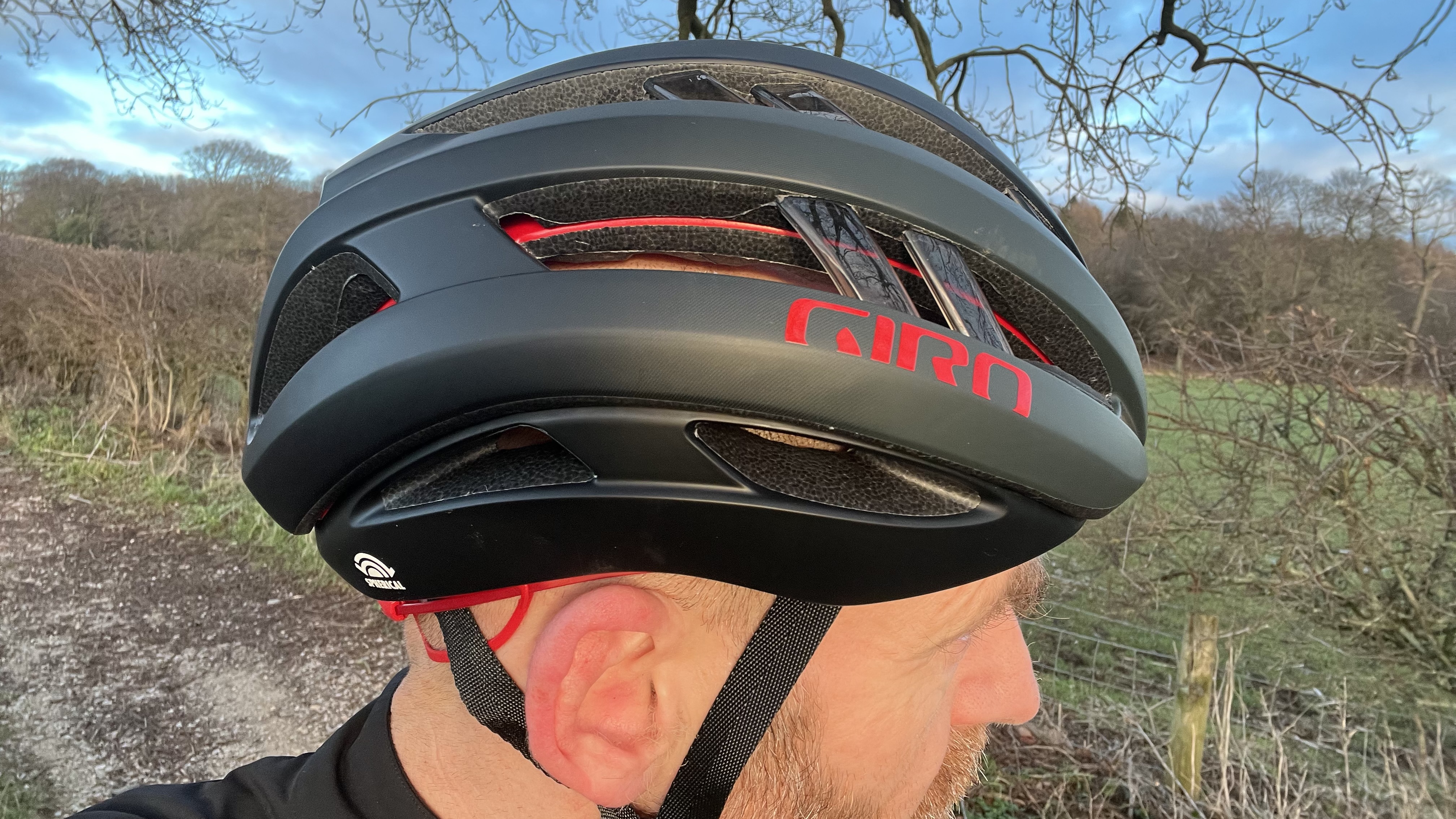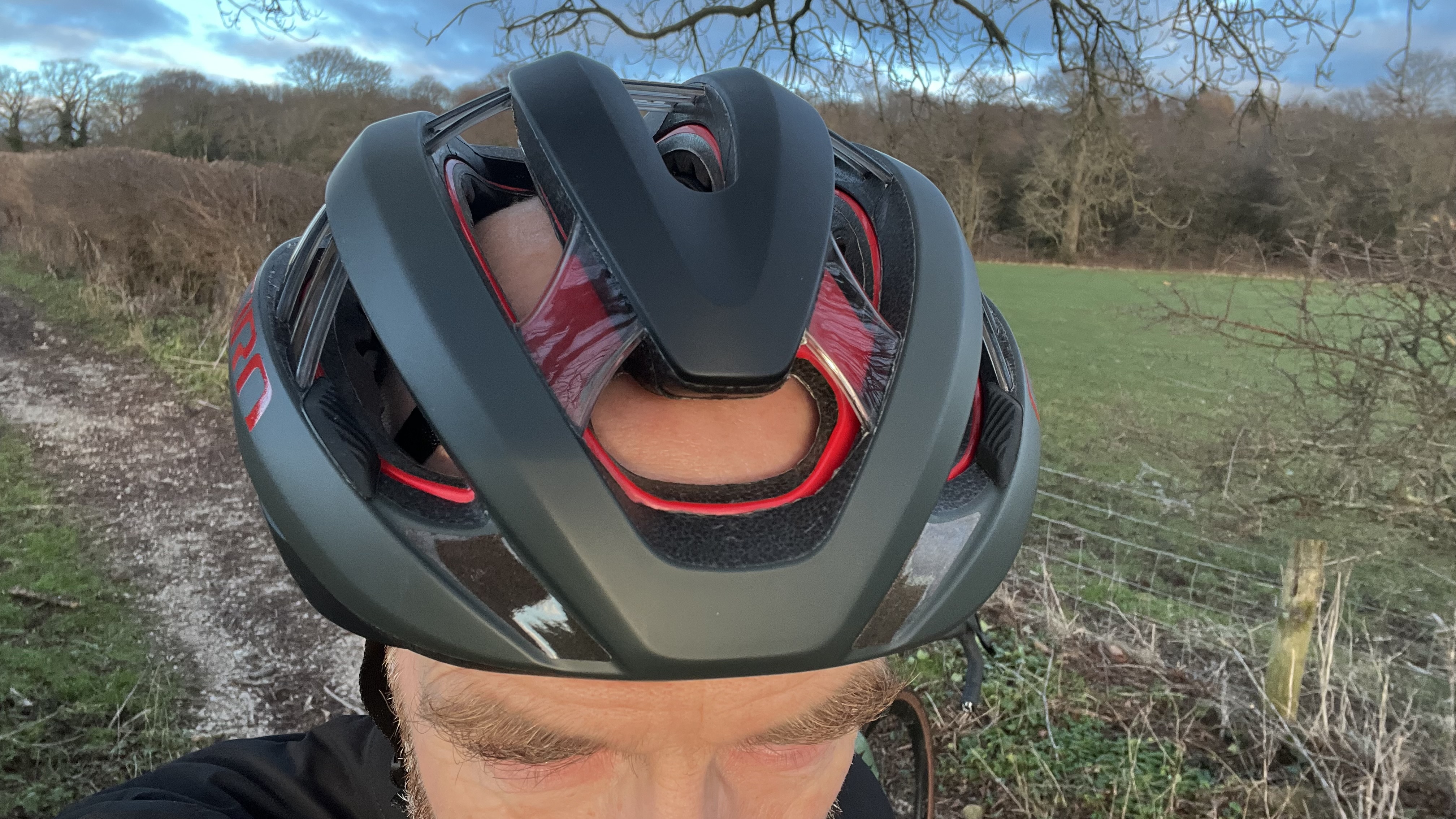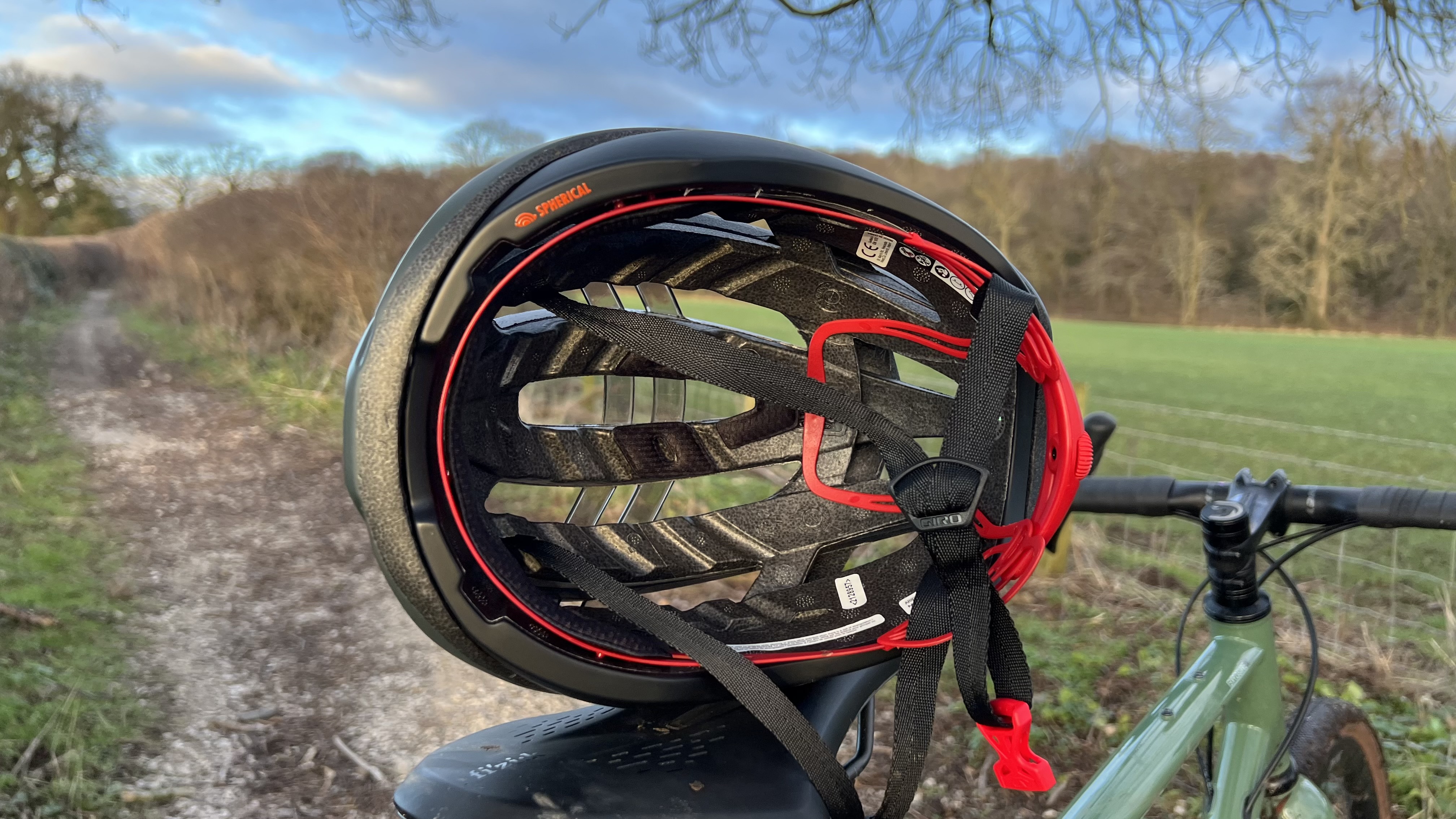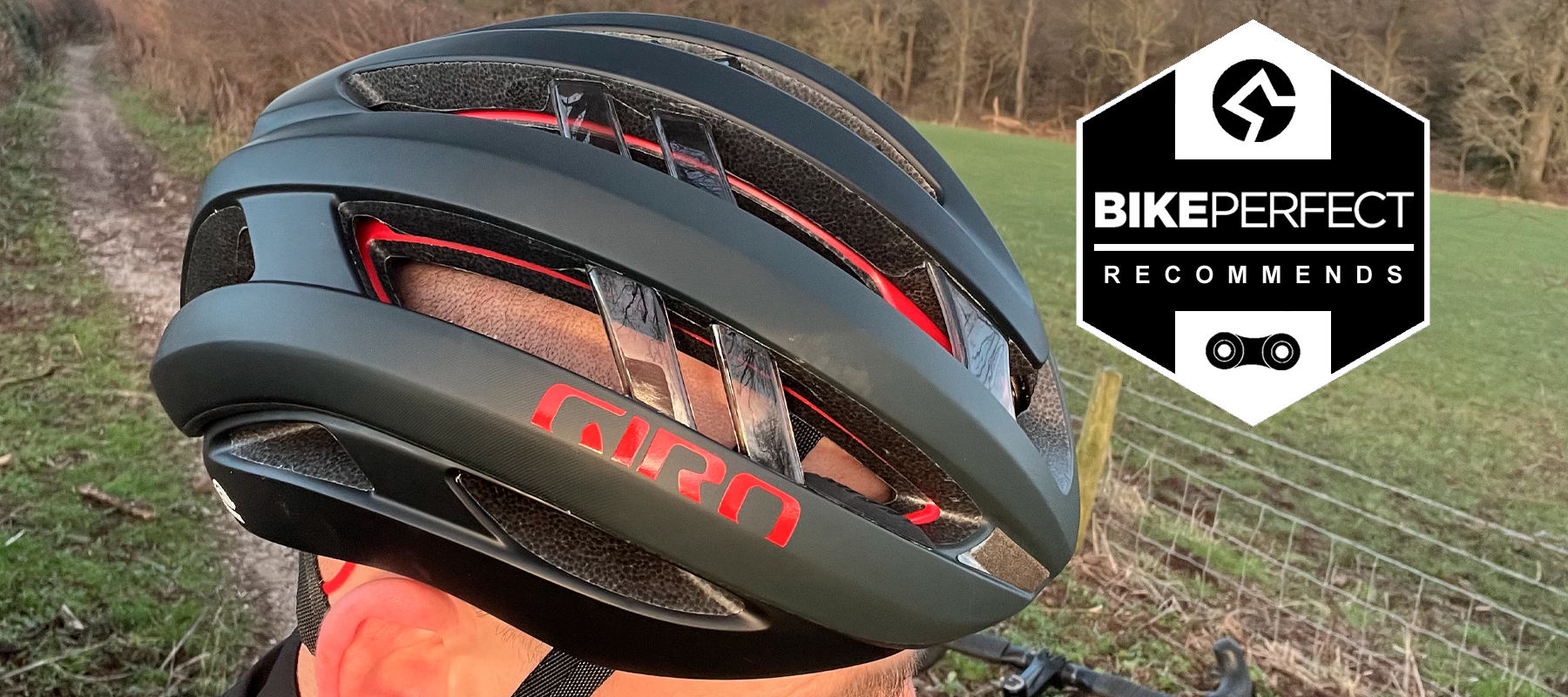Bike Perfect Verdict
Expensive but an outstanding mix of light weight with exceptional all speeds cooling, unique independently verified protection and ‘barely there’ comfort.
Pros
- +
‘Best ever’ Spherical MIPS protection
- +
Outstanding cooling air flow
- +
Low weight
- +
Secure, minimalist cradle
- +
Glasses grippers
- +
Crash replacement plan
- +
3 sizes, 6 colors
Cons
- -
Expensive
- -
Not as aero as the Giro Eclipse
- -
No crash alert tech
Why trust BikePerfect
Giro say their new Aries Spherical is the lightest, coolest and fastest road/gravel/XC MTB helmet they’ve ever made. It’s also the safest helmet ever tested by the independent Virginia Tech laboratory. How have they achieved that and what’s this new flagship version of their unique double shell tech like to ride?

Design and build
The Aries is a direct development of Giro’s Aether and shares the same ‘Spherical MIPS’ design. That uses two separate hard shell encased, progressive density nano-bead EPS foam shells stacked on top of each other. These are tethered together with stretchy MIPS tabs so they can rotate like a ball and socket, dissipating impact energy in the process. The outer/upper shell is also reinforced with an evolved version of the Aura strengthening arch with a single front bar and central twin bar.
That lets Giro create what they call a 24-vent structure. which is basically a series of five fully open channels from front to rear. There are also four exhaust vents and two flank vents on either side with transverse internal channels helping cross flow at lower speeds. The Aries is also the first Giro helmet to use a central forehead vent formed by joining the two central bars early and stopping them short of the lower rim. The lower rim on the inner helmet has cuts outs to pull air up from inside your glasses lenses. There are rubber grip tabs for the arms of your glasses if you take them off and slide them into the front of the Aries.
In terms of fit, the Aries comes in three sizes and uses the minimalist Roc Loc 5+ Air cradle with tiny rear adjustment dial and three different vertical positions. While my test sample had standard Ionic+ anti microbial padding, production versions will get ‘DryCore’ sweat management brow pads with a central strip of silicon to gutter your juices sideways away from your eyes.
Unlike some helmet brands Giro don’t include any sort of impact reporting technology in the Aries so you’ll need to rely on a smart watch or phone if you want that feature. You do get to choose from six different colors though.

Performance
While you get a lot in terms of features, what you don’t get is a lot of helmet – but I mean that in a good way. At 264g for my medium sample, the Aries is five percent lighter than the Aether it replaces and 2g lighter than the Giro Eclipse Spherical MIPS aero road helmet. It’s also seven percent narrower than the Aether – which puts it in contention with conventional construction lids like Specialized’s S-Works Prevail 3 for weight and bulk.
Giro helmets have fitted me really well since I bought my first one in 1991, so once I’d adjusted the lightweight Y sliders on the straps the medium Aries clicked neatly and securely into place. Even before I started riding the minimal padding, ambient airflow and largely unobstructed heat radiation backed up Giro’s ‘Like nothing’ tag line. And while Giro’s testing only found a 2.3 percent cooling efficiency improvement over the Aether, that’s the breeziest helmet I’d ridden before and the Aries is ridiculously cool. In fact to be honest it was painfully cold as a bald bloke testing in frosty conditions, but you’ll be glad of the exceptional venting and heat management in hotter climes.
While you’ll never need to find out in an ideal world, it’s reassuring to know that if you bounce your head off the deck the Aries not only exceeds the normal CE and CPSC but it’s the safest helmet ever tested by the independent Virginia Tech laboratory. That’s across all categories including urban and MTB not just road, which shows just how effective the combination of the aura bars and Spherical MIPS is. Obviously these are lab tests designed to be universally applicable across all designs though, so I wouldn’t advise rocking up to a bike park in an Aries rather than a full face helmet. If you’re after minimum aero drag, the Eclipse Spherical is still the fastest road helmet Giro offer too. Otherwise the combination of enhanced protection way it pulls air through even at low speeds is really well suited to gravel, bikepacking and even XC MTB use if you don't need a peak.
Plus, while the price is undeniably high, it's not unusual for a premium helmet and Giro offer a crash replacement scheme if you end up testing the impact protection of your Aries.

Verdict
I’ve been lucky enough to visit Giro’s Californian headquarters and see their ultra comprehensive testing and design studios complete with thermal sensing head forms and impact sleds. That means I’m not that surprised by the level of cooling or protection built into the Aries. I’ve also ridden the Aethos and Eclipse helmets very extensively and single digit percentage improvements in weight are impossible to detect even for a hyper critical bald bloke.
Despite that familiarity and background knowledge it’s cooling performance and comfort is exceptional especially when combined with the reassurance of uniquely excellent crash safety in a compact and versatile on/off road format.
Tech specs: Giro Aries Spherical helmet
- Price: $300.00 / £289.99 / €320.00
- Sizes: S – 20”–21.75” / 51–55cm, M – 21.75”–23.25” / 55–59cm L – 23.25”–24.75” / 59–63cm
- Colors: Matte black, Matte white, Matte carbon, Matte ano blue, Matte anohardbor blue fade, Matte metallic coal/space green
- Weight: 264g (medium tested)

Guy Kesteven has been working on Bike Perfect since its launch in 2019. He started writing and testing for bike mags in 1996. Since then he’s written several million words about several thousand test bikes and a ridiculous amount of riding gear. He’s also penned a handful of bike-related books and he reviews MTBs over on YouTube.
Current rides: Cervelo ZFS-5, Specialized Chisel, custom Nicolai enduro tandem, Landescape/Swallow custom gravel tandem
Height: 180cm
Weight: 69kg

